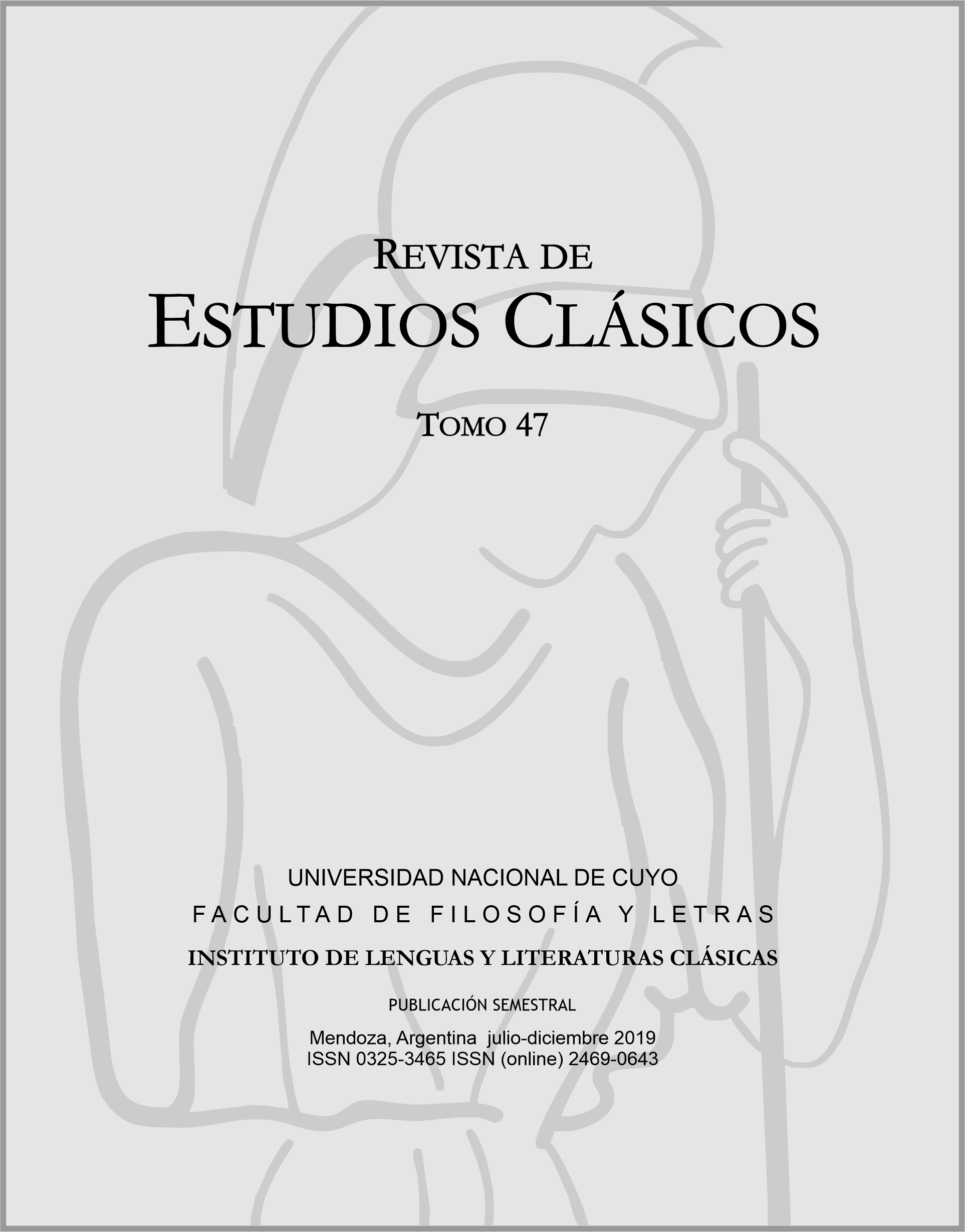Marginality and madness in sophoclean tragedy
The forms of Ajax's nosos
Keywords:
Ajax, tragedy, madness, marginalityAbstract
The central place of madness in tragedy has contributed to value the significance of this genre for establishing a disease representation that underlines above all the marginality of the hero. In this sense, Sophoclean Ajax is relevant due to the double form of the nosos in this drama. Not only there is a prominence of nosological vocabulary there, but the ‘healing’ of the madness only gives way in Ajax to a new form of insanity, in many ways indistinguishable from the old one. Considering this complexity, the aim of this paper is to analyze the linguistic resources and the aspects of the performative development that dim the limits of the disease forms in Ajax, in order to show that it is possible to summarize the marginal condition of the Sophoclean hero in the claim that he is in essence ‘his’ illness.
References
Biggs, P. (1966). The disease Theme in Sophocles’ Ajax, Philoctetes and Trachiniae. CPh 61: 223- 235.
Burian, P. (2012). Polyphonic Ajax. En Ormand, K. (ed.). A Companion to Sophocles (pp. 69-83). Oxford: Wiley-Blackwell.
Catoni, M. (2015). The Iconographic Tradition of the Suicide of Ajax: Some Questions. En Most, G. & Ozbek, L. (eds.). Staging Ajax’s Suicide (pp. 15-28), Pisa: Edizioni della Normale.
Ceschi, G. (2009). Il vocabolario medico di Sophocle. Analisi dei contatti con il Corpus Hippocraticum nel lessico anatomo-fisiologico, patologico e terapeutico. Venezia: Istituto Veneto di Scienze, Lettere e Arti.
Ciani, M. G. (1974). Lessico e funzione della follia nella tragedia greca. Boll. Ist. Fil. Gr 1: 70-110.
Collinge, N. E. (1962). Medical Terms and Clinical Attitudes in the Tragedians. BICS 9: 43-55.
Finglass, P. J. (ed.) (2011). Sophocles. Ajax. Cambridge: CUP.
Gambon, L. (2016a). La invención de la locura de los héroes: acerca de las locuras trágicas en la Antigüedad griega.
En Gambon, L. (coord.). A quien Dioniso quiere destruir ... La tragedia y la invención de la locura (pp. 25-52), Bahía Blanca: Ediuns.
Gambón, L. (2016b). Alucinación y locura: la experiencia de la mirada marginal en la tragedia griega. En Gambon, L. (coord.). A quien Dioniso quiere destruir ... La tragedia y la invención de la locura (pp.149-176). Bahía Blanca: Ediuns.
Garvie, A. (ed.) (1998). Sophocles. Ajax. Warminster: Aris & Phillips.
Harris, W. V. (ed.) (2013). Mental Disorders in the Classical World. Leiden: Brill.
Hesk, J. (2003). Sophocles: Ajax. London: Duckworth.
Israelovich, I. (2017). The Theme of Illness in Sophocles'Ajax. Scripta Classica Israelica 36: 1-16.
Jebb, R. (ed.) (1907). Sophocles: The Plays and Fragments. Part VII: The Ajax. Cambridge: CUP.
Jong, I. J. F. de (2006). Where Narratology Meets Stylistic: the Seven Versions of Ajax’ Madness. En Jong, I. J. F. de & A. Rijksbaron (eds.). Sophocles and the Greek Language. Aspects of Diction, Syntax and Pragmatics (pp. 73-93). Leiden: Brill.
Kamerbeek, J. C. (1953). The Plays of Sophocles: Commentaries, Part I: The Ajax. Leiden: Brill.
Kosak, J. C. (2004). Heroic Measures: Hippocratic Medicine in the Making of Euripidean Tragedy. Studies in Ancient Medicine. Leiden: Brill.
Mattes, J. (1970). Der Wahnsinn im griechischen Mythos und in der Dichtung bis zum Drama des fünften Jahrhunderts. Diss. Heidelberg.
Medda, E. (1983). La forma monologica. Ricerche su Omero e Sofocle. Pisa: Scuola Normale Superiore di Pisa.
Medda, E. (2013). "Spazio scenico e conflitto tragico nell’Aiace di Sofocle". En La saggezza dell’illusione. Studi sul teatro greco (pp. 25-52). Pisa: Edizioni ETS.
Mitchell-Boyask, R. (2008). Plague and the Athenian Imagination. Cambridge: CUP.
Mitchell-Boyask, R. (2012). Heroic Pharmacology: Sophocles and the Metaphors of Greek Medical Thought. En Ormand, K. (ed.). A Companion to Sophocles (pp. 316-330). Oxford: Wiley-Blackwell.
Most, G. (2013). The Madness of Tragedy. En Harris, W. V. (ed.). Mental Disorders in the Classical World (pp. 395-410). Leiden: Brill.
Munteanu, D. L. (2012). Tragic Pathos. Pity and Fear in Greek Philosophy and Tragedy. Cambridge: CUP.
O’ Brien-Moore, A. (1924). Madness in Ancient Literature. Weimar: R. Wagner Sohn.
Ormand, K. (ed.) (2012). A Companion to Greek Tragedy. Oxford: Wiley-Blackwell.
Padel, R. (1997 [1995]). A quien un dios quiere destruir. Buenos Aires: Manantial.
Paduano, G. (2018). Follia e letteratura, storia di un’affinità elettiva. Dal teatro di Dioniso al Novecento, Roma: Carocci editore.
Pearson, A. C. (ed.) (1955 ¨1924]). Sophoclis. Fabulae. Oxford: OUP.
Säid, S. (2013). From Homeric ate to Tragic Madness. En Harris, W. V. (ed.). Mental Disorders in the Classical World (pp. 363-393). Leiden: Brill,.
Stanford, W. B. (ed.) (2002 [1963]). Sophocles. Ajax, New York: Bristol Classical Press.
Thumiger, Ch. (2017). A History of the Mind and Mental Health in Classical Greek Medical Thought. Cambridge: CUP.
Downloads
Published
How to Cite
Issue
Section
License
Aquellos autores/as que tengan publicaciones con esta revista, aceptan los términos siguientes:
- Los autores/as conservarán sus derechos de autor y garantizarán a la revista el derecho de primera publicación de su obra, el cuál estará simultáneamente sujeto a laLicencia Creative Commons Atribución-NoComercial-CompartirIgual 2.5 Argentina (CC BY-NC-SA 2.5 AR). (https://creativecommons.org/licenses/by-nc-sa/2.5/ar/)que permite a terceros compartir la obra siempre que se indique su autor y su primera publicación esta revista.
- Los autores/as podrán adoptar otros acuerdos de licencia no exclusiva de distribución de la versión de la obra publicada (p. ej.: depositarla en un archivo telemático institucional o publicarla en un volumen monográfico) siempre que se indique la publicación inicial en esta revista.
- Se permite y recomienda a los autores/as difundir su obra a través de Internet (p. ej.: en archivos telemáticos institucionales o en su página web) antes y durante el proceso de envío, lo cual puede producir intercambios interesantes y aumentar las citas de la obra publicada. (Véase El efecto del acceso abierto).












